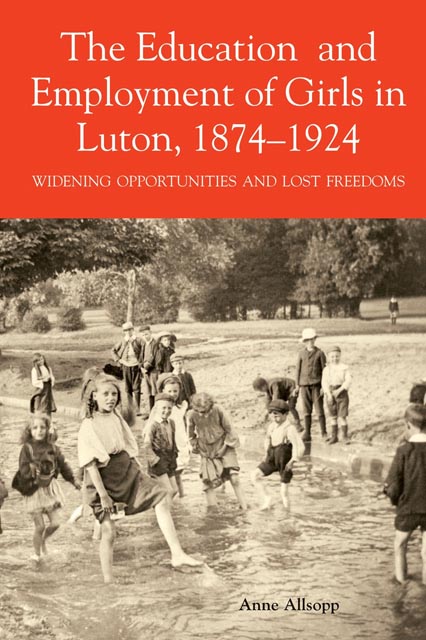Book contents
- Frontmatter
- Contents
- List of Illustrations
- List of Tables
- Dedication
- Acknowledgements
- Abbreviations
- Introduction
- Chapter One Luton: Scientiae et labori detur
- Chapter Two Further Perspectives Concerning Employment Patterns for Women
- Chapter Three Sunday Schools
- Chapter Four Education in the Time of the School Board
- Chapter Five Teaching: An Alternative Occupation
- Chapter Six Teacher Training and the Education of Students Aged Over Fourteen Under Bedfordshire County Council
- Chapter Seven Elementary Education 1903–1924
- Chapter Eight Rural Schools
- Chapter Nine Learning and Living
- Chapter Ten Secondary Education for Girls
- Conclusion
- Appendix
- Bibliography
- Index
Introduction
Published online by Cambridge University Press: 03 August 2023
- Frontmatter
- Contents
- List of Illustrations
- List of Tables
- Dedication
- Acknowledgements
- Abbreviations
- Introduction
- Chapter One Luton: Scientiae et labori detur
- Chapter Two Further Perspectives Concerning Employment Patterns for Women
- Chapter Three Sunday Schools
- Chapter Four Education in the Time of the School Board
- Chapter Five Teaching: An Alternative Occupation
- Chapter Six Teacher Training and the Education of Students Aged Over Fourteen Under Bedfordshire County Council
- Chapter Seven Elementary Education 1903–1924
- Chapter Eight Rural Schools
- Chapter Nine Learning and Living
- Chapter Ten Secondary Education for Girls
- Conclusion
- Appendix
- Bibliography
- Index
Summary
This book complements two others which have already been published in this series. Volume 78, Strawopolis (1999), looked at the transformation of Luton in the middle of the nineteenth century ‘from a market town, where hats were made, to principally a manufacturing centre’. Volume 82, Vauxhall Motors and the Luton Economy, 1900–2002 (2003), explored the life of the town in the twentieth century when the dominant hat industry was replaced by an equally dominant motor industry. This study (Volume 84) has concentrated on the changing role of women against these backgrounds.
The year 1874 was significant as it was the one in which the first Luton School Board was elected. In the same year education became compulsory for the town's children. New schools were built and by 1924 elementary schools were offering a wider and more stimulating style of curriculum. Of particular importance was the opening of a secondary school for girls under the leadership of a dedicated headmistress who brought new vision to the furtherance of higher education for girls. By 1924 the school had established a tradition of excellence and had laid foundations for the future. This book has therefore concentrated on the years between 1874 and 1924.
The focus of this study was originally intended to be the provision of schooling, but it soon became clear that the demands of the traditional hat industry and those of the School Board were closely intertwined. The theme therefore ceased to be education alone but the fascinating relationship between education and the changing patterns of employment for women.
Luton itself is worthy of serious study because its character is in some respects unique. In 1874 political power in the town lay with businessmen, mostly self-made, who ruled over every aspect of urban life and saw that prosperity could be achieved within the hat trade and without academic qualifications. Consequently, before 1874, education, particularly for girls, had not been given high priority. This is reflected in illiteracy rates in Luton, which, in 1856, were 44% opposed to the national average of 35%.
One reason for this was the existence of a domestic industry which dominated children's lives. Women, too, could spend the whole of their working lives in the hat industry and they were undoubtedly central to the prosperity of the town.
- Type
- Chapter
- Information
- The Education and Employment of Girls in Luton, 1874-1924Widening Opportunities and Lost Freedoms, pp. xix - xxiiPublisher: Boydell & BrewerFirst published in: 2023



